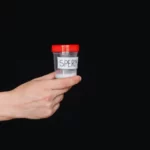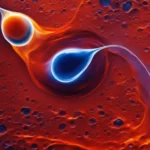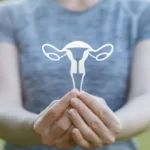Malfunction in spermatogenesis can have significant implications for male fertility. Understanding the intricacies of sperm structure and the factors that contribute to infertility is crucial for developing effective treatments. In recent research, scientists from the University Hospital Bonn have made a groundbreaking discovery regarding the role of cylicins in male fertility.
Cylicins, specialized proteins found in the perinuclear theca of sperm cells, play a vital role in spermiogenesis – the process of sperm development. The proper structure of sperm, including the formation of the head and tail, is dependent on the presence of cylicins. Loss or absence of these proteins can lead to infertility in both mice and humans.

Related: Why Pregnancy Not Happening? 14 Possible Reasons
Key Takeaways:
- Cylicins are essential for the proper structure of sperm and are crucial for male fertility.
- Research conducted on mouse models revealed that the absence of cylicins resulted in reduced fertility and complete infertility.
- Defects in the head and tail structure of sperm can be attributed to changes in cylicin genes.
- Testing for cylicin gene variants may help identify causes of male infertility.
- Transplanting damaged sperm heads, along with the genetic material, offers a potential solution for successful fertilization in individuals with cylicin-related infertility.
Related: How Often Do I Need A Pap Smear?
The Importance of Cylicins in Spermiogenesis
To truly understand the role of cylicins in spermiogenesis and male fertility, researchers conducted extensive studies using mouse models. These models were created with the absence of Cylicin 1 and/or Cylicin 2, allowing for a closer examination of the impact of these proteins on sperm development and function.
The findings from these experiments were remarkable. Mice lacking Cylicin 1 exhibited reduced fertility, resulting in smaller litter sizes when mated with healthy females. The absence of multiple copies of cylicins in male mice led to complete infertility, with no successful pregnancies observed.
Upon closer examination, it became evident that the absence of cylicins had a profound effect on the structure and function of sperm cells. Sperm heads were smaller in size and exhibited damaged acrosomes, the structure responsible for aiding in fertilization. Additionally, the tails of these sperm cells curled around the head, severely limiting their mobility and ability to reach the egg.
Furthermore, the absence of cylicins also resulted in the absence of a crucial structure known as the sperm calyx within the perinuclear theca. This highlighted the critical role that cylicins play in the development of the sperm structure, specifically in maintaining the stability and connection between the different parts of the sperm.
Related: Unbelievable! You Can Get Pregnant with Tubes Tied
Implications for Human Male Infertility
The research conducted in mouse models has shed light on the potential implications for human male infertility. Collaborating with colleagues from the University of Münster, the team of scientists identified a patient with gene variants of Cylicin 1 and Cylicin 2, leading to defects in the head and tail structure of his sperm. This discovery suggests that changes in cylicins may contribute to fertility problems in humans, providing valuable insights into the complex network of factors governing sperm development and male infertility.
To address these issues, fertility assessments should include testing for cylicin gene variants in cases of male infertility. This approach can help identify potential causes and guide the development of targeted interventions. By understanding the role of cylicins in spermiogenesis and sperm structure, medical professionals can better diagnose and manage fertility concerns in males.
Additionally, the researchers propose a potential solution for successful fertilization in individuals with cylicin-related infertility – sperm transplantation. This innovative approach involves transplanting the damaged sperm heads, along with the genetic material, into egg cells. While further research is needed to explore the feasibility and efficacy of this technique, it offers hope for couples struggling with infertility due to cylicin gene variants.
The implications of this research extend beyond the laboratory and into clinical practice. By studying the role of cylicins in male fertility, scientists are paving the way for improved diagnosis, treatment, and family planning options for individuals and couples facing infertility challenges.
Related: Getting Pregnant with Blocked Fallopian Tubes
Conclusion
The research conducted by the University Hospital Bonn and the Transdisciplinary Research Unit “Life & Health” at the University of Bonn provides important insights into the role of cylicin proteins in sperm structure and male fertility. It has been discovered that the loss or absence of cylicins can result in defects in the head and tail structure of sperm, leading to reduced fertility or complete infertility in both mice and humans.
Identifying the gene variants of cylicins in individuals experiencing infertility issues may become a crucial tool in determining the causes of male infertility. By understanding the impact of these gene variants, healthcare professionals can develop targeted approaches for diagnosis and treatment.
Additionally, the research reveals a potential solution for successful fertilization in individuals affected by cylicin-related infertility. Transplanting damaged sperm heads, along with the genetic material, into egg cells offers a hopeful possibility for overcoming structural damage and achieving successful fertilization.
This groundbreaking research sheds light on the complex network of factors involved in sperm development and male infertility. By further exploring the role of cylicins and their implications, scientists and medical professionals are taking significant steps toward addressing infertility causes and developing potential solutions for those struggling to achieve pregnancy.
Related: Top 19 Obstetrical Complications
Frequently Asked Questions (FAQs)
What are cylicin proteins?
Cylicin proteins are specialized proteins found only in sperm cells that play a crucial role in the proper structure of sperm and male fertility.
What is spermiogenesis?
Spermiogenesis is the process by which round immature cells in the testes develop into mature sperm with a head and tail, forming the unique shape of sperm cells.
What is the role of cylicins in spermiogenesis?
Cylicin proteins, namely Cylicin 1 and Cylicin 2, are located in the perinuclear theca (PT) – a cytoskeletal structure surrounding the sperm head – and are essential for the development and stability of the sperm structure.
How do cylicin protein deficiencies affect male fertility?
Loss or absence of cylicin proteins can result in defects in the head and tail structure of sperm, leading to reduced fertility or complete infertility in both mice and humans.
How can cylicin gene variants be assessed in cases of male infertility?
Testing for cylicin gene variants should be considered to identify potential causes of male infertility. Gene variant analysis can help assess the presence of cylicin-related fertility problems.
What are the implications of cylicin deficiencies in humans?
Defects in cylicins can lead to head and tail structure defects in human sperm, resulting in infertility. Identifying cylicin gene variants can provide important insights into the causes of male infertility.
Is there a potential solution for successful fertilization in individuals with cylicin-related infertility?
Transplanting the damaged sperm heads, along with the genetic material, into egg cells offers a potential solution for successful fertilization despite structural damage to the sperm caused by cylicin deficiencies.
What does this research reveal about sperm development and male infertility?
The research highlights the crucial role of cylicin proteins in the proper structure of sperm and male fertility, providing valuable insights into the complex network of factors governing sperm development and its impact on fertility.












